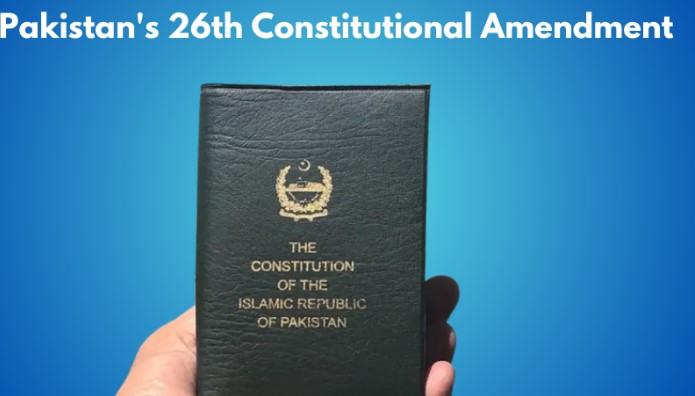1. 26th Constitutional Amendment
The 26th Constitutional Amendment was introduced during a pivotal period in Pakistani politics marked by growing demands for change. The current state of politics made it clear that a more democratic and equitable election system was required, especially for the younger generation. The amendment was a calculated attempt to bring the political system back to life in acceptance of the critical role that younger people may play in determining the future of the nation.
2. Amendment’s Goals
a. Reducing the Voting Age:
The amendment allows younger people to become involved in the electoral process by lowering the voting age from 21 to 18. It is believed that such shift will foster a sense of civic duty and raise youth political engagement.
b.Improving Electoral Integrity:
The amendment adds strict guidelines to guarantee electoral openness. This includes laws designed to keep an eye on campaign finance and guarantee the justice and fairness of all voting procedures.
c. Encouraging Political Accountability:
The amendment aims at addressing problems such as misconduct and corruption in the political sphere by placing a strong emphasis on responsibility between political parties and their candidates.
d . Encouraging Democratic Participation:
By enabling an increased number of people to participate in government and policymaking, the amendment promotes a more equal political climate.
3. 26th Amendment Features
1. Reduction of Voting Age
The 26th Constitutional Amendment’s decrease of the voting age to 18 is its most significant feature. This choice recognizes young people’s increasing political participation and awareness. The amendment not only empowers young but also signifies a progressive change in Pakistan’s political politics by granting them the right to vote.
Benefits of Reducing the Voting Age
Reducing the voting age has the following effects:
a. Enhanced Voter Base:
The amendment greatly expands the electorate by incorporating 18-year-olds, so reflecting a wider demography. By including them, we can make sure that younger people’s opinions and concerns are taken into account while having political conversations.
b.Youth Participation:
The goal of the amendment is to encourage young voters to get involved in politics by getting them involved in political discourse and decision-making processes. This may result in a society that is more politically aware and involved in the community.
c . A reflection of shifting societal norms
the voting age change is a manifestation of a wider acknowledgement that young people may make valuable contributions to the advancement of society and have the power to shape the destiny of the nation.
2. Measures of Electoral Integrity
In order to address long-standing concerns about the fairness of elections in Pakistan, the 26th Constitutional Amendment introduces a number of provisions to improve electoral integrity.
Important Integrity Metrics
a.Tighter Campaign Finance Regulations:
Stricter rules on the financing of political campaigns are introduced by the amendment. This seeks to guarantee that elections are won on the basis of merit rather than financial power and to lessen the impact of money on politics.
2.Election Process Monitoring:
Improved methods, such as the use of impartial observers, are implemented for keeping an eye on the electoral process. The public’s trust in the electoral system must be increased, and this requires transparency.
3.Initiatives for Voter Education:
In addition to the amendments, programs to educate the public about their rights and the democratic process are planned. Citizens are empowered and inspired by this knowledge.
3. Accountability in Politics
The 26th Constitutional Amendment places a strong emphasis on political responsibility in an effort to combat widespread corruption and raise Pakistan’s standards of administration.
Features of Accountability
a.Party Accountability:
It is mandatory for political parties to uphold open and transparent records pertaining to their funds and operations. This guarantees that their operations and finances are transparent to the public.
b.Requirements for Candidate Disclosure:
It is mandatory for candidates to reveal their financial histories so that voters can base their choices on the candidates’ honesty and openness.
c.Legal Structure for Violations:
The amendment creates a structure within which election laws might be violated, guaranteeing the efficiency and enforceability of accountability systems.
4. Encouragement of Democratic Involvement
In Pakistan’s political scene, the 26th Constitutional Amendment acts as a stimulant to encourage more democratic engagement.
Promoting Diverse Participation
a. Inclusive Political climate:
The amendment creates a more inclusive political climate by reducing the voting age and encouraging accountability. As a result, different demographic groups represented in governance in ways that reflect their varying interests.
b. Empowering Marginalized Groups:
Making sure that their perspectives heard and reflected in the political sphere another way that inclusivity focused on.
c. Civic Education projects:
In order to encourage active involvement from all societal groups, the amendment supports civic education projects. Voting and civic duty emphasized as important aspects of this education.
implications for Pakistani democracy
The 26th Amendment to the Constitution has significant ramifications for Pakistan’s democratic structure. Its success rests on how well its provisions carried out and how devoted political leaders are to preserving democratic principles.
1. Enhancing Democratic Structures
Through the improvement of electoral accountability and integrity, the amendment helps to fortify democratic institutions.
4. implications for Pakistani democracy
The 26th Amendment to the Constitution has significant ramifications for Pakistan’s democratic structure. Its success rests on how well its provisions carried out and how devoted political leaders to preserving democratic principles.
1. Enhancing Democratic Structures
Through the improvement of electoral accountability and integrity, the amendment helps to fortify democratic institutions.
Stronger Institutions’ Advantages
a.Public Trust:
As long as voters believe that elections are transparent and fair, they will be more inclined to have faith in democratic institutions. Democracy cannot be stable without this trust.
b. Political Stability:
Less political turbulence might result in a more stable environment for governance when elections conducted transparently. Development and economic growth depend on stability.
c. Citizen Engagement:
Robust democratic establishments foster proactive citizen involvement, guaranteeing that people have a sense of agency in shaping political outcomes.
2. Dealing with Political Disagreements
Pakistan’s political polarization addressed by the 26th Amendment to the Constitution.
Methods for decreasing Polarization
a. Encouraging Dialogue:
The amendment promotes cooperation over confrontation among political factions by cultivating a culture of accountability and transparency.
b. Youth Involvement:
Getting young people involved in politics the power to change the political narrative, mending long-standing rifts, and promoting a more cooperative political atmosphere.
3. Expanding the Role of Civil Society
The amendment gives civil society organizations a framework to promote democratic reforms since it places a strong emphasis on accountability and openness.
Engagement of Civil Society
a. Election Monitoring:
In order to make sure that the terms of the amendment followed, civil society organizations extremely important in keeping an eye on elections and holding political players responsible.
b. Reform Advocacy:
The amendment gives civil society the ability to push for additional democratic reforms, establishing a positive feedback loop that strengthens democratic norms.
5. Obstacles and Things to Think About
The 26th Constitutional Amendment offers Pakistan many chances to improve democracy, but in order for successful, a number of issues need resolved.
1. Political Will and Execution
The political of elected officials necessary for the modification implemented successfully. The objectives of the amendment might not be accomplished if political players do not pledge to respect the values of accountability and transparency.
2. Education and Public Awareness
It is essential to educate the people about the amendment and its ramifications. The amendment’s potential influence restricted if voters not adequately informed about their rights and obligations during elections.
3. Getting Past Resistance
The effective implementation of the amendments may face obstacles due to resistance from deeply ingrained political interests. Politicians who profit from the current situation could.
4. Making Specific Institutional and Legal Frameworks
Strong institutional and legal structures are necessary to uphold the 26th Constitutional Amendment’s requirements. This involves making certain that election authorities are autonomous and have the authority to impose laws.
6.Pakistan democratic development
The 26th Amendment to the Constitution marks a significant turning point in Pakistan’s democratic development. The amendment seeks to empower young and advance a more equitable political environment by decreasing the voting age and improving electoral integrity. Stronger democratic institutions, less political polarization, and higher levels of civic involvement can result from its effective implementation.
1.In Pakistan, how many constitutions exist?
During the process of creating the 1956 and 1973 constitutions in Pakistan’s three constituent assemblies (1947–1954, 1955–1956, and 1972–1973), the two contentious issues that hindered the formation of an agreement among ethnonational groups were federalism and the state’s Islamic nature.
2. What is the number of articles in the Pakistani Constitution?
With 280 articles, the Constitution is broken down into seven sections: I Introduction; II Fundamental Rights and Policy Principles; III The Federation of Pakistan; IV Provinces; V Relations Between the Federation and Provinces; VI Finance, Property, Contracts and Suits; VII The Judicature; and VIII Elections.
3. What is Pakistan’s 26th Amendment to the Constitution in 2024?
The amendment aims to redefine judicial authorities, alter legal procedures, and change several parts of the judicial system. The proposal amends several articles, including 38, 48, 81, and 175A, and adds Article 9A, which states that everyone has the fundamental right to a clean and healthy environment.
4. What does Pakistan’s Constitution’s Article 26 mean?
The Constitutional Package, also known as the 26th Constitutional Amendment Bill, is a piece of legislation that aims to remove the Supreme Court’s suo motu powers, set the term of the Chief Justice of Pakistan (CJP) at three years, and give the prime minister the authority to choose the next CJP from the three most senior SC members.
Also Read: CNIC Logo Exclusive Boost Organ Donation 16 September




